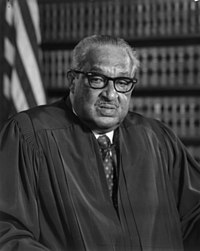Merrion v. Jicarilla Apache Tribe
As was the usual practice at the time, the oil companies negotiated directly with BIA, who then presented the contracts to the tribal council.
[4] While the oil and gas was from reservation land, Merrion paid severance taxes to the state of New Mexico under the provisions of 25 U.S.C.
[2] Merrion did not want to pay a severance tax to both New Mexico and the tribe, and filed suit in the United States District Court for the District of New Mexico, along with such major companies as Atlantic Richfield (now part of BP), Getty Oil, Gulf Oil, and Phillips Petroleum (now ConocoPhillips), among others.
[2] In addition, the plaintiffs argued against the entire concept of tribal sovereignty, stating that it had been a "legal fiction for decades.
The arguments were the same as at the district court level, with the oil companies stating that tribal sovereignty did not apply to taxation of non-Indians conducting business on the reservation.
In an unusual move, no written decision was issued, and the attorneys were told to reargue the case en banc.
McKay stated that as he recalls, he and Holloway were in disagreement with Seth, who favored a limited view of the tribe's authority to tax the oil companies.
Following that hearing, in a 5-2 decision, the Tenth Circuit reversed the District Court, holding that the tribe had the inherent power under their tribal sovereignty to impose taxes on the reservation.
[1][2][5] The oil companies immediately appealed and the United States Supreme Court granted certiorari to hear the case.
[2] The oil companies argued that Oliphant, currently limited to criminal cases, should be expanded to civil matters as well.
[7] Amici briefs were filed by Montana, North Dakota, Utah, Wyoming, New Mexico, Washington (state), the Mountain States Legal Foundation, the Salt River Project Agricultural Improvement and Power District, Shell Oil, and Westmoreland Resources in support of the oil companies.
Cooney argued that the tax was a violation of the Commerce Clause, in that Congress divested the tribes of that authority when they enacted 25 U.S.C.
It also appeared that Justice Harry Blackmun was also going to write a separate dissent, but he also stated that he would wait to see Marshall's opinion.
Justice Stewart retired, and President Ronald Reagan had appointed Sandra Day O'Connor to replace him.
Marshall noted that the tribe had a properly formed constitution, approved by the Secretary of the Interior, and that it included that the tribal council may impose taxes on non-members doing business on the reservation.
is strongest when the revenues are derived from value generated on the reservation by activities involving the Tribes and when the taxpayer is the recipient of tribal services.
Stevens also noted that the various statutes that were passed in regards to mineral rights and leases were silent as to the authority of a tribe to impose taxes.
He noted that in matters involving their own members, the tribe could act in manners that the federal government could not, such as discriminating against females in citizenship cases (citing Santa Clara Pueblo v. Martinez, 436 U.S. 49 (1978)).
[11] Tribal authority over non-members was always severely limited, in both a civil and criminal context, and he viewed both Oliphant and Montana as controlling in this area also.


